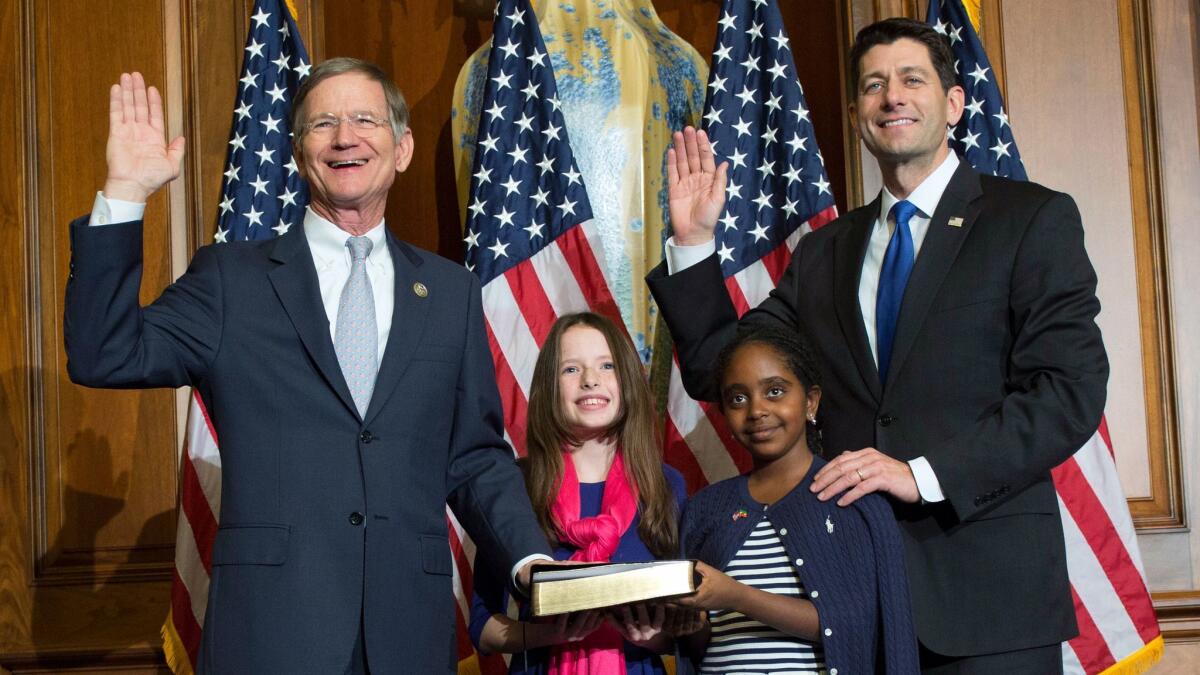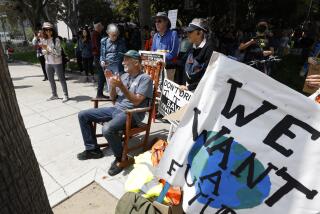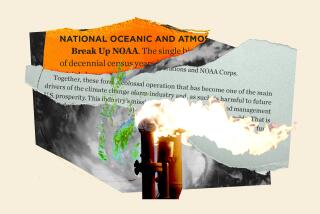Column: Good riddance to Rep. Lamar Smith (R-Texas), the most obnoxious climate change denier in Congress

To our knowledge, Rep. Lamar Smith never brought a snowball onto the House floor like Sen. James Inhofe (R-Okla.), to “prove” that climate change was a hoax.
But once you’ve said that, you’ve said everything. In all other particulars, Smith has been the preeminent climate change denier in Congress. That’s a problem, because he also has been serving as chairman of the House Committee on Science, Space and Technology, the last place where someone devoted to undermining scientific research belongs. From that perch, he’s harassed government officials, Earth scientists and other academics whose work refutes his position that the human role in climate change is a myth.
On Thursday, Smith announced that he will be retiring when the congressional term, his 16th, ends in 2018. He didn’t give much detail on his reasons, although he noted that he’ll be term-limited out of his chairman’s post then.
Good riddance. May we never see his like again.
I have not and will not allow anyone to manipulate the science or coerce the scientists who work for me.
— NOAA Administrator Kathryn Sullivan tells Rep. Lamar Smith to take a hike, November 2015
As chairman of the science committee, Smith waged a war on scientists, research administrators and even state officials whose offense was to establish the human role in climate change. He has used his congressional authority to try to shield big oil companies such as Exxon Mobil from accusations that they connived in undermining public understanding of the climate crisis. Smith’s legacy will be long-lasting and entirely discreditable. Our generation and those that follow will be paying the price of obstructionism like his, into the limitless future.
As we’ve observed, Smith’s credentials as a climate change denier long have been unassailable. He dismissed the 2014 report by the United Nations’ Intergovernmental Panel on Climate Change, which stated that “human interference with the climate system is occurring” and causes negative “impacts on natural and human systems on all continents and across the oceans” as “nothing new” and “more political than scientific.”
Of a White House report in May 2014 citing the urgency of taking steps to address climate change, Smith said it was designed merely “to frighten Americans into believing that any abnormal weather we experience is the direct result of human CO2 emissions. In reality, there is little science to support any connection between climate change and more frequent or extreme storms.”
In 2015, Smith spent months throwing a conniption fit over a report published by several government climate experts in the June 26 issue of the widely respected journal Science. He demanded emails and other correspondence from the scientists involved in the study, purportedly to ferret out evidence that they manipulated their data. In a Thanksgiving Day op-ed in the conservative Washington Times, he called the work of dedicated government researchers “not good science, [but] science fiction.” Strong pushbacks came from the American Assn. for the Advancement of Science, the publisher of Science, among other research organizations. They upbraided Smith for implying scientific misconduct “despite a lack of public evidence” and all but labeled him an irresponsible ideologue.
Meanwhile Kathryn D. Sullivan, a former astronaut who headed the National Oceanic and Atmospheric Administration, Smith’s prime target, rejected his demand for internal emails. “I have not and will not allow anyone to manipulate the science or coerce the scientists who work for me,” she told Smith.
Earlier this year, Smith could be found carrying water for Exxon Mobil by trying to bully state attorneys general investigating allegations that the company fraudulently undermined public understanding of climate change while possessing scientific evidence that the problem is real. The investigations stem in part from reporting by The Times and InsideClimate News into the company’s decades-long misinformation and disinformation campaign, to cast doubt on climate change science.
Playing the role of Exxon Mobil’s marionette, Smith issued subpoenas to Eric Schneiderman and Maura Healey, the attorneys general of New York and Massachusetts, for documents of their contacts with climate activists, scientists and legal experts — among them former Vice President Al Gore and California billionaire Tom Steyer. On the deadline day, Smith’s inbox was bare, except for messages from the attorneys general crisply advising him that his request was grossly out of line and, in fact, unconstitutional, since he was out to breach state sovereignty enshrined in the Bill of Rights.
What really motivates Smith? As we’ve observed in the past, the attack on climate change research isn’t rooted so much in science but economics. The campaign exploits the vocabulary of science, but it’s really designed to protect the profits of the fossil fuel industry. Surprise, surprise: If one adheres to the precept to “follow the money,” one discovers that pantsfuls of it flow from the oil and gas industry into Smith’s campaign accounts. Oil and gas contributors have directed nearly $760,000 in Smith’s direction over his three-decade career in Congress. Since 2013, when he became chairman of the science committee, the oil and gas industry has topped the roster of his campaign donors.
During his subpoena campaign against Schneiderman and Healey, we asked, “How long does Lamar Smith intend to embarrass himself, his committee and Congress in this ridiculous quest to shut down investigations that could harm his patrons in the petroleum industry?” Finally, we have the answer: Until to the end of next year. Then, thankfully, he’ll be gone.
Keep up to date with Michael Hiltzik. Follow @hiltzikm on Twitter, see his Facebook page, or email [email protected].
Return to Michael Hiltzik’s blog.
More to Read
Get the L.A. Times Politics newsletter
Deeply reported insights into legislation, politics and policy from Sacramento, Washington and beyond. In your inbox three times per week.
You may occasionally receive promotional content from the Los Angeles Times.











